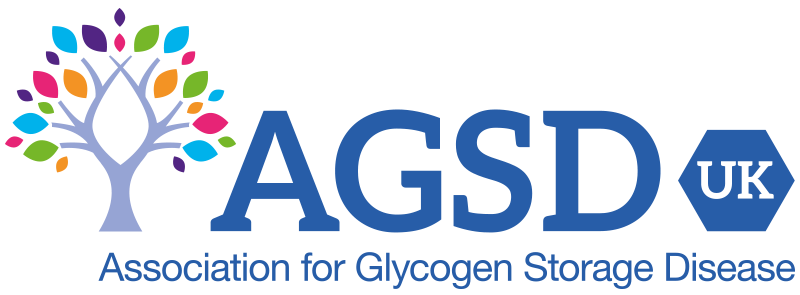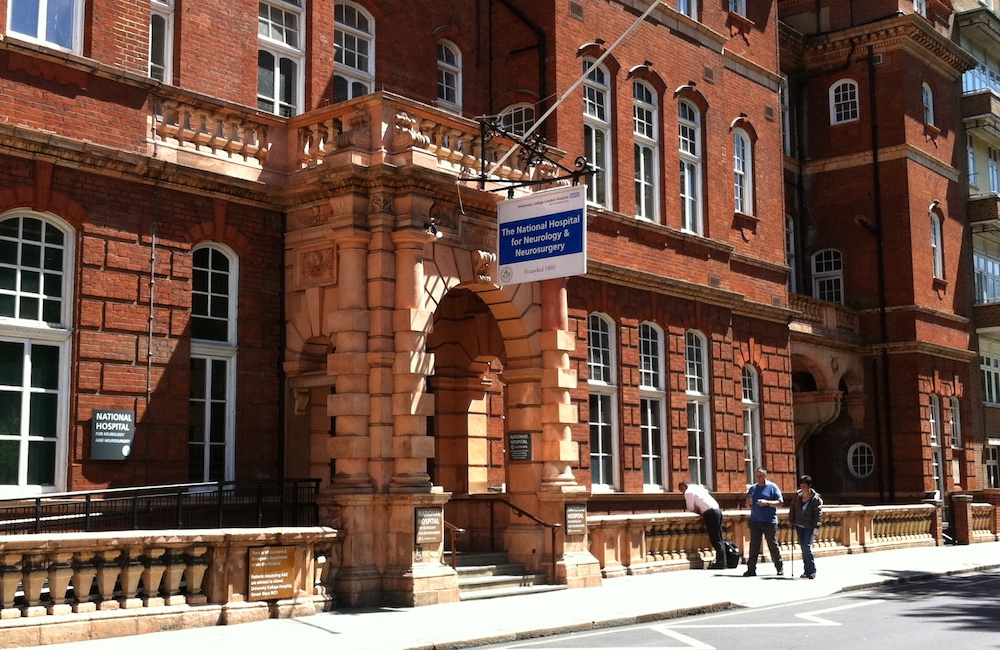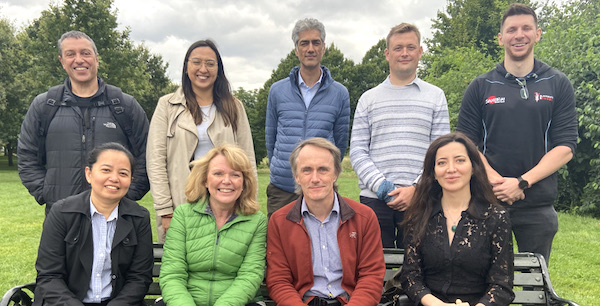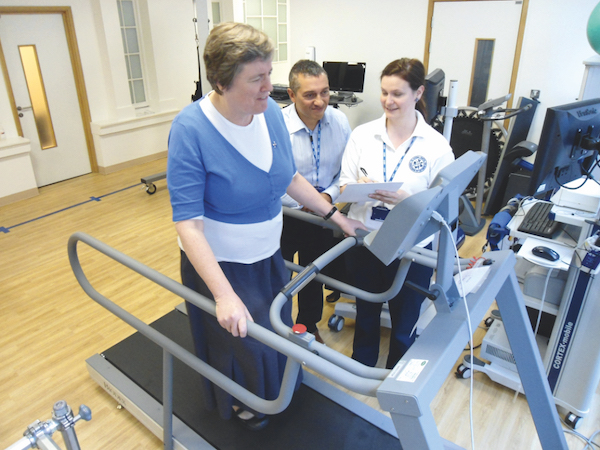It is usually a long and frustrating process to get diagnosed with this ultra rare disease, but once you are it opens the door to understanding and improvement.
Support from the national centre of excellence
The UK McArdle Disease Clinic
The AGSD-UK is very pleased to co-operate with the UK McArdle Disease Service at the MRC Centre for Neuromuscular Disease, part of the National Hospital for Neurology and Neurosurgery in Queen Square, London.
The National Hospital for Neurology and Neurosurgery, Queen Square, London.
This is the national centre of excellence for McArdle disease. It is an invaluable resource for our patient community and sees over 240 patients. The clinic enables patients to be seen by a range of professionals of different disciplines, in one visit. Through seeing so many patients they build their understanding of the disease. We understand that to date no other country operates a clinic such as this, with patients elsewhere usually being seen individually by neuromuscular or neurology consultants.
The AGSD-UK encourages everyone with a diagnosis of McArdle disease to ask their general practitioner to refer them to the UK McArdle Clinic. For those in England and Scotland this service is nationally funded and there is no charge to your GP, for other parts of the UK your GP or health authority will be charged for your visit.
Contact and referral details
Secretary to Prof. Ros Quinlivan
MRC Centre for Neuromuscular Diseases
National Hospital for Neurology and Neurosurgery
Queen Square
London WC1N 3BG
Direct line: 020 3448 8132
Switchboard: 0845 155 5000 ext. 88132
Email: enquiry.mcardle@uclh.nhs.uk
GPs referring a diagnosed patient:
for assessment, advice, management and support, send a referral letter to the above.
Professionals referring for diagnosis:
Please visit the clinic’s web site and download the pre-referral form: McArdle Disease Service.
Regular clinic days
Clinics are currently held twice per month on Wednesdays, with 9 people per clinic. Newly referred patients may be seen several times in the first year, but then are typically seen once a year or even every two years. This can vary according to individual needs.
Staff of the clinic
The clinic has a full multi-disciplinary team.
- Prof Ros Quinlivan, Consultant Neuromuscular Physician
- Dr Matt Parton, Consultant Neurologist
- Dr Ezgi Arikan, Clinical Research Fellow
- Dr Richard Godfrey, Sports Scientist
- Jatin Pattni, Clinical Neuropsychologist
- Peter Finnigan, Neuromuscular Physiotherapist
- Maria Patasin, Clinical Nurse Specialist
- Margaret MacRae & Charlotte Ellerton, Highly Specialist Dietitians
- Dr Ralph Wigley, Senior Clinical Scientist
- Yasmin Begum, NCG McArdle Manager and secretary to Prof Quinlivan
In addition an experienced patient representing AGSD-UK sometimes visits the McArdle clinic on a voluntary basis. They provide information about the support available to McArdle people, answer your questions and can help interested patients to meet each other in an informal atmosphere.
Members of the clinic’s multi-disciplinary team.
Back L-R: RG, EA, JP, RW, PF. Front L-R: MP, RQ, MP, MM.
Aims of the clinic
- To provide an accurate diagnosis.
This is extremely important from the point of view of treatment and genetic counselling for patients and their families. Diagnosis is confirmed by DNA analysis. Some patients diagnosed in years past have been shown not to have the disorder and have usually been re-diagnosed with another neuromuscular disorder.
- To provide regular assessment and monitoring.
Includes a 12 minute exercise assessment, ECG, and blood tests for Creatine Kinase (CK), renal function and urate. Some patients are referred for cardiac assessment.
- To provide dietary advice.
Regular weight monitoring and calculation of BMI. Individual dietary assessment and advice by dietician.
- To provide physiotherapy advice.
Household tasks may be quite difficult for some. Rehabilitation advice and referral to local community resources, where needed.
- To educate patients about the condition.
Information and education are very important. Many patients are debilitated due to previous inappropriate advice, such as avoidance of all exercise. Regular gentle aerobic exercise is vital. Other symptoms may be falsely attributed to McArdle’s.
- To provide psychological and emotional support.
Psychological support is provided by the psychologist. Emotional support is achieved by enabling patients to meet one another. The AGSD-UK representative helps to facilitate this process.
- To engage in research to improve treatment.
The clinic partners with patients to advance medical knowledge and understanding and to undertake research into the condition. A range of research studies has been undertaken.
Exercise assessment on corridor or treadmill.
What happens at the McArdle clinic
Appointments
After several appointments following diagnosis, patients are normally seen every 1-2 years, but this may vary according to your needs. The clinic is held on the second and fourth Wednesday of each month.
Telephone clinics
Patients needing more frequent support, such as during efforts to lose weight or to improve fitness, can have telephone based appointments in between the physical appointments.
Preparing for your appointment
It is suggested that you wear comfortable shoes and loose fitting clothing suitable for the exercise assessment, or bring a change of shoes with you.
Make a note in advance of any questions that you have for each member of the team, so that you don’t forget them on the day.
Timings
Everyone is given the time they need on each session. Appointment times are staggered to avoid a lot of waiting, but you may be at the clinic for a large part of the day. Visits to three buildings are involved. Each individual may need a different amount of time with the various team members. They try to keep waiting times between sessions to the minimum but sometimes a delay is unavoidable.
Important note on cancellations
If you cannot attend an appointment please advise the clinic at least four days in advance so that someone on the waiting list may be invited in your place. Unused appointments threaten the future funding of the clinic.
Sessions to complete in clinic
• Neuromuscular consultant
Prof Ros Quinlivan or Dr Matt Parton.
• Exercise physiologist
You will have a twelve minute walking assessment on a treadmill or in the corridor. This gives a method of assessing you and can help teach people how to achieve ‘second wind’.
• Dietician
Dietary assessment and advice provided by the dietician.
• Neuropsychologist
Some patients will see the psychologist for emotional and psychological support.
• Blood tests
Blood is taken to monitor various elements including Creatine Kinase (CK), kidney function and uric acid.
• Weight and height
These figures are used to calculate your Body Mass Index. Control of weight is important as excess weight exacerbates the symptoms.
• Electrocardiogram (ECG)
To date, heart involvement is not a documented feature of McArdle disease but they do ECGs as part of a general health check. Some patients may be referred for cardiac assessment.
Any questions?
If you have any questions please do not hesitate to ask the clinic’s specialist nurse, or contact Prof Quinlivan’s secretary (see contact panel).



